

Brexit panic wipes $2 trillion off world markets - as it happened. It’s almost 24 hours since it first became clear that David Cameron’s EU referendum had not gone as the PM had planned.
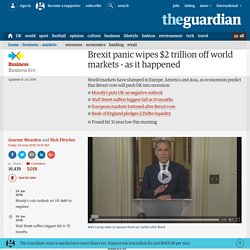
That realisation has triggered one of the most dramatic, volatile and downright scary trading sessions in the last decade. New estimates tonight say Brexit has wiped out over two trillion dollars of value, worldwide: So, as City traders hit the pillow (or in some cases the gin bottle), we should also wrap up. Here’s a very brisk summary of the state of play. The British pound has suffered its biggest one-day selloff in recent history, as the shock news the the UK is heading out of the European Union sparked panic in the markets. Sterling suffered a jaw-dropping plunge in the early hours of Friday in London, from $1.50 against the US dollar to just $1.33. The London stock market suffered steep losses at the open, but recovered to finish down 199 points or minus 3.1%.
And that left central bankers (once again) to pick up the pieces. So until then, a very good night! UK economy: GDP growth, interest rates and inflation statistics. Untitled. Fast Fashion Is the Second Dirtiest Industry in the World, Next to Big Oil - EcoWatch. “The clothing industry is the second largest polluter in the world ... second only to oil,” the recipient of an environmental award told a stunned Manhattan audience earlier this year.
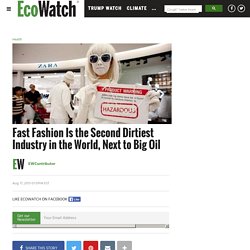
“It’s a really nasty business ... it’s a mess.” Since 2011, the Greenpeace Detox campaign has challenged some of the world's most popular clothing brands to eliminate all releases of hazardous chemicals. Photo credit: Jonas Gratzer / Greenpeace While you’d never hear an oil tycoon malign his bonanza in such a way, the woman who stood at the podium, Eileen Fisher, is a clothing industry magnate. On a warm spring night at a Chelsea Piers ballroom on the Hudson River, Fisher was honored by Riverkeeper for her commitment to environmental causes. When we think of pollution, we envision coal power plants, strip-mined mountaintops and raw sewage piped into our waterways. Globalization means that your shirt likely traveled halfway around the world in a container ship fueled by the dirtiest of fossil fuels. 5 things you probably didn’t know about the fashion industry. Mark Twain once wrote, “Clothes make the man.
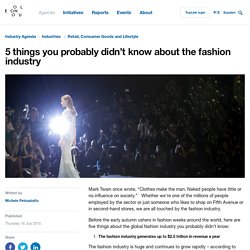
Naked people have little or no influence on society.” Whether we’re one of the millions of people employed by the sector or just someone who likes to shop on Fifth Avenue or in second-hand stores, we are all touched by the fashion industry. Economy Of Fashion: How Different Trends Reflect The Financial State. It's common knowledge fashion is cyclical in nature.
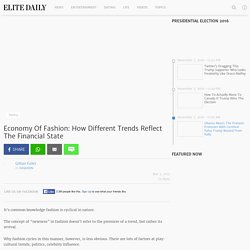
The concept of “newness” in fashion doesn't refer to the premiere of a trend, but rather its revival. Why fashion cycles in this manner, however, is less obvious. There are lots of factors at play: cultural trends, politics, celebrity influence. One one of the most surprising factors to influence the cycle of fashion, though, is the state of the global economy.
If you think about it, it makes sense. During tougher times, if you need new clothes, the focus is less on passing fads and more on classic, quality pieces worth the expenditure because they’ll last (which also aids in cutting down cost per wear). As FIT professor John Mincarelli tells ABC News, “In rough economic times, people shop for replacement clothes,” adding “basics” prevail during an economic downturn. Economist George Taylor was the first to notice the correlation between fashion and the economy; he developed the “Hemline Theory” to describe his findings. Pinterest How? The%20Economic%20Impact%20of%20the%20Fashion%20Industry%20 %20JEC%20report%20FINAL. Two years after Rana Plaza, have conditions approved in Bangladesh’s factories? On 24 April 2013, an eight-story garment factory collapsed in Dhaka, the capital of Bangladesh.
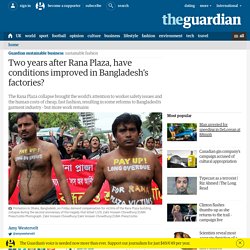
The building’s fall killed 1,134 people and injured hundreds of others. The Rana Plaza tragedy was not caused by an earthquake or a terrorist attack, but rather by poor construction and a lack of oversight – and, in some ways, by a growing global desire for more cheap fashion. It’s been two years since the Rana Plaza tragedy, and although much remains to be done to ensure the rights and safety of workers in Bangladesh’s still-booming garment industry, progress has been made. Global brands including H&M, Mango, Primark, the Gap and Walmart, among a dozen others, have contributed $21.5m to the Rana Plaza Donors Trust Fund, which was set up to award compensation to victims and their families. According to Srinivas Reddy, Bangladesh director for the International Labour Organization (ILO), which is administering the fund, there is a shortfall of $8.5m. Safety, but not security Attention or pressure.